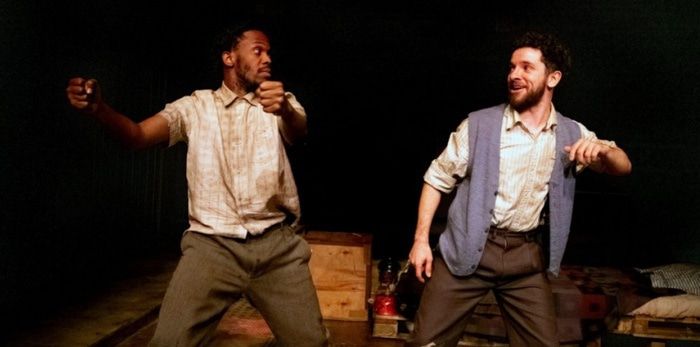Theatre Review | Blood Knot: Athol Fugard’s explosive family drama resonates in the era of Black Lives Matter
By Ruby Fischer
The Orange Tree
Excellent: Kalungi Ssebandeke and Nathan McMullen Photo: Richard Hubert Smith
SOUTH Africa, 1961. Morrie Pietersen (Nathan McMullen) and his half-brother Zach (Kalungi Ssebandeke) live together in the putrid shanty town of Korsten, Port Elizabeth. Morrie, light-skinned and bookish, dreams of a two-man farm in one of the “blank spaces” on the map while Zach, illiterate and weathered from working long hours in menial jobs, seeks only the company of women and old memories of nights on the town. It’s a story that in Athol Fugard’s play pits the “blood knot” against the politics of colourism as this complex family drama unfolds.
While the story may feel a little far from home in Richmond, there’s a ring of authenticity to the Orange Tree’s vivid revival in which McMullen and Ssebandeke, an excellent pairing under Matthew Xia’s direction, balance whimsical theatrics with muscular emotional performances.
McMullen, wide-eyed and meticulous as Morrie, folds clothes, prepares dinner and bathes his brother’s feet with metronomic devotion, while Ssebandeke’s Zach is explosive and unpredictable, his candid resentment wrestling with an expressive tenderness.They are indissolubly bound, emphasised by the entire action of the play being confined to the dusty interior of their shabby tin shack.
Composer Xana and lighting designer Ciaran Cunningham bring a claustrophobic heat to the space, their intelligent design conjuring the relentless whine of mosquitoes and the haze of afternoon light leaking through a tin roof. Movement director Angela Gasperatto ignites the physical language of the play, while Kevin McCurdy’s fight scene is, fittingly, difficult to watch.
Fugard describes himself as being a “witness of his time.” But in the age of Black Lives Matter, a resurging alt-right and an increasingly polarising discourse on migration, his work still feels
achingly relevant.
